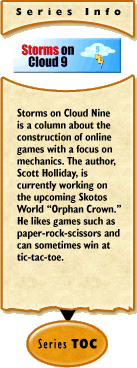
Actors and Reactorsby Scott Holliday Ever since I've come over to Skotos, I've been wildly impressed by the RP community here. Like many of us I've spent years suffering in online games where the players speak only in game terminology and jargon. Imagine my surprise when a well-known lich in Grendel's Revenge politely whispered to me, reminding me what I had just said was OOC. Naturally, my response was a quick whispered, "(ooc: Thank you!)" Which brings to question, what is RP? From even basic experience, it is obvious that the definition of what is (and what is not) role-play varies from person to person. I've been in a tabletop RPG in which one of the players sat silently through a whole session, only speaking to report dice rolls and actions. One might easily surmise that he wasn't high on my list of good role-players. However, you would have to realize that this WAS the character he was playing, and that normally he was talking non-stop. Furthermore, his facial expressions alone made him into an amazing character. One of my favorite definitions for RP comes from the best Gamemaster I've ever had the honor to play with. In his words, "role-players are actors in their own story." I've carried that tidbit of wisdom around with me ever since. The lesson is that each player in an RPG generally sees the story as the story of their character. Good or bad, they generally want the story to center around them. Some players want to take the story and show off. Others want to demonstrate their acting skills. Others want to delve into the twists of the story itself. One way a GM can reward his players is to give them a little bit more control. Since GMs themselves usually enjoy role-play, the reverse is also true. This idea can be carried over to online games, however the scale difference is important. The maximum number of players I can usually handle well in a tabletop is six. Online games can number in tens, hundreds, or thousands. Under these conditions, it is nearly impossible for GMs to let players influence the story directly. However, if there is going to be a story, there better be a way for players to do something! Jessica Mulligan wrote an excellent analysis of how to approach this problem in Biting the Hand. So then, how does the developer motivate the players to choose roles that feel authentic to the setting? I feel a list coming on...
Personally, I really like the idea of player-based voting. Let the players police themselves! The players will have the most contact with each other, and can best decide what nature of world they are building. Naturally, GMs should also have a method to reward role-play (perhaps a separate voting system?), however giving players power is an important step. I'm very thankful for the timing of Travis' article. I had already created a system for player-based RP voting in Orphan Crown. When Travis pointed out the holes in it so succinctly, I quickly started making revisions. As a conclusion, here is the current system as planned. You are welcome to locate any problems with it, as I would love to improve it further.
This seems like a pretty effective system. While a group could still try to "game the system", they are limited by the size of their group. Also, since players can vote as much as they want, if they vote often, then each encounter counts (not just the flamboyant ones). In a way, this also encourages older players to introduce themselves to new players... because a new player means a new vote just entered the game! Naturally, if a player gets deleted, then all of their votes should also be nullified. I'd like to see what you folks have to say. The major flaw that I still see is that an "evil" player might be voted badly just because he is performing his chosen role too well. Maybe someone out there has a solution to that...
|
